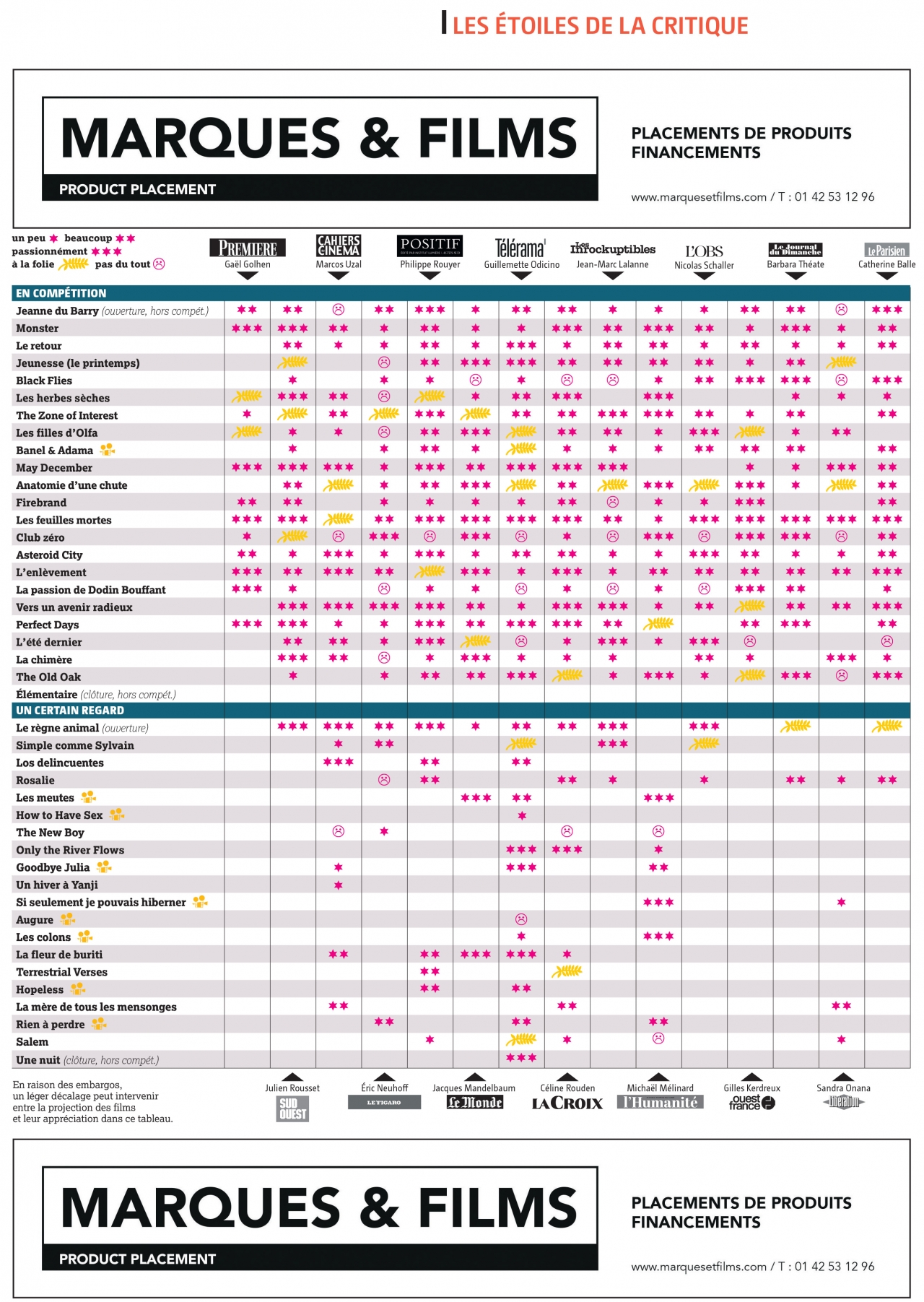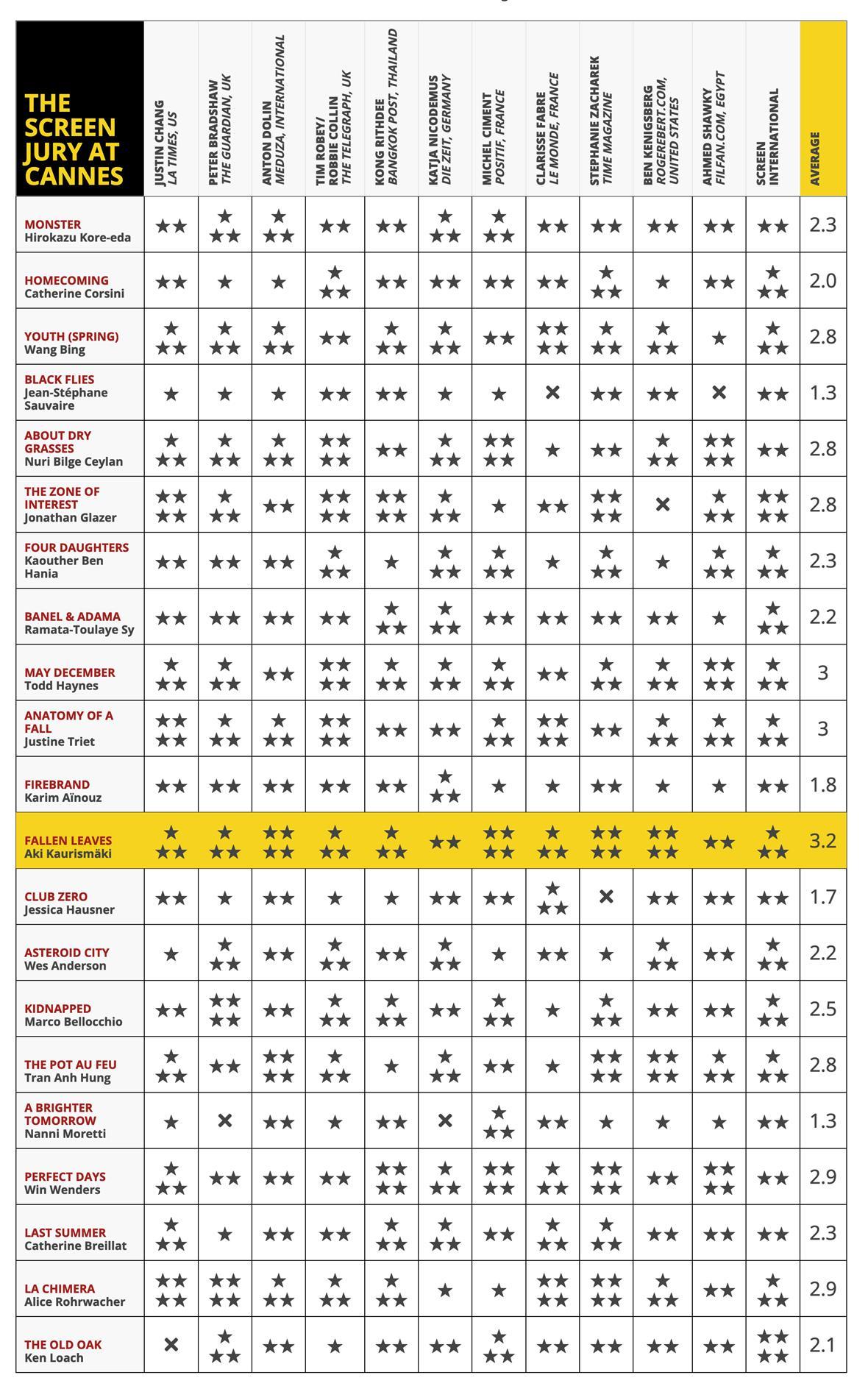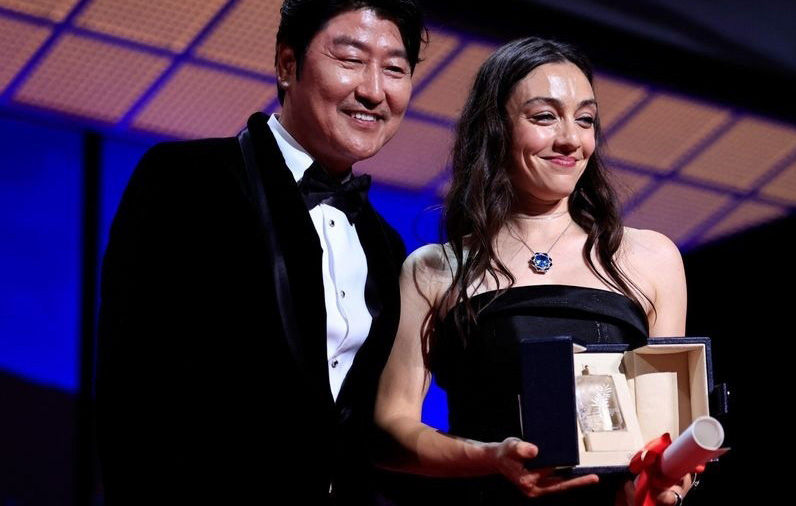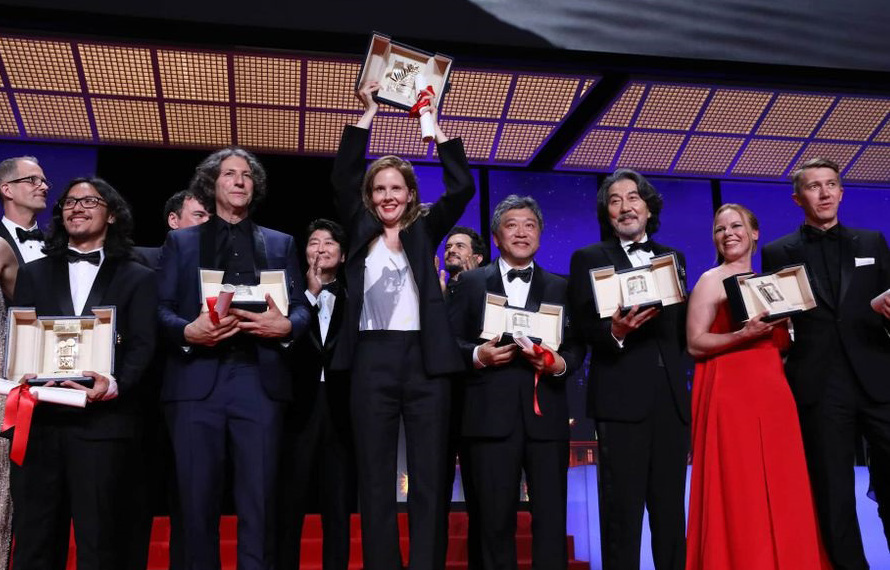
ICI C'EST CANNES! The rumored feast lived up to its reputation. The 76th Cannes International Film Festival lived up to its name with the return of the greats. Once again, the "Cultura" editorial team traveled to Cannes to review the festival.
This year's festival will go down in history as one of the most successful in terms of both topicality and popularity in competition. For the most part, this year's selection lived up to Cannes' reputation. While there were a few that didn't quite live up to the hype (like The Idol), they certainly generated a lot of buzz and made the festival a talking point.
One of the standout features of this year's festival was the lineup of "long" films. In competition, Wang Bing's Spring and Nui Bilge Ceylan's About Dry Grasses boast running times of 212 and 197 minutes, respectively. And Steve McQueen's documentary Occupied City, which was selected for a special screening, has a running time of 262 minutes. All three of these films were well received, proving that Cannes was right to select them. At a time when we are rethinking the cinematic experience and the theatrical experience, Cannes has brought to the forefront works at the extremes of serialization and OTT, creating a new conversation in the global film industry.

Palme d'Or goes to Anatomy of a Fall
This year's selection in competition lived up to its name and ended with one of the least controversial awards in recent years. The top prize, the Palme d'Or, went to Anatomy of a Fall, directed by French woman Justine Triet. This is the third time a female director has won the Palme d'Or, and the second time in two years that a female director has won it alone, following Julia Ducournau for Titan in 2021. The first female director to win the Palme d'Or was Jane Campion for The Piano. She shared the award with Chen Kaige for Farewell My Concubine in 1993.
The main driving force behind the success of Anatomy of a Fall is the power of a compelling screenplay. According to Indiewire's poll of 60 experts from all five continents,1 Anatomy of a Fall was voted the best screenplay of any feature film screened this year, with 30% of the vote. Beginning with a ball falling down a flight of stairs, Anatomy of a Fall is a chilling legal drama that traces the devastation of a family following the mysterious death of husband Samuel (Samuel Theis). His wife, Sandra (Sandra Hüller), is a German writer who moved to Grenoble to follow her French novelist husband. For her, Samuel's death marks the end of their precarious marriage and the destruction of their family. To refute the accusation that she murdered her husband, as she wrote in her novel, and to protect her family, Sandra must prove that Samuel's death was a suicide.

The beauty of the film is that the unclear events of how and why Samuel died plunge his son Daniel (Milo Machado Graner) into a deep hole. Daniel is the biggest victim of the cold, dry, emotionally restrained trial. The cracks in Sandra and Samuel's relationship begin to show when Samuel makes a mistake that nearly causes Daniel to lose his sight. Samuel's guilt over Daniel's death and Sandra's resentment of him lead to the breakdown of their marriage, a wound that goes much deeper than Daniel's loss of sight. The camera focuses on Daniel as he speculates about the death during the heated courtroom battle. Throughout the narrative, Daniel's emotions ebb and flow between Sandra and Samuel.
This is where the subtlety of the screenplay shines through. The way the film chooses to reveal the truth of the case is through conflicting statements, especially when Sandra changes her story in the second half to protect her secret and to protect Daniel and the dead Samuel. The conversation on the eve of his death revealed only through an audio file, pushes Daniel over the edge of a cliff of pain. Just as the trauma and healing of the protagonist's mother's death was a major driving force in the director's previous film, Sibyl, the trauma and healing of Daniel is at the heart of Anatomy of a Fall.
Anatomy of a Fall also made history by winning both the Palme d'Or and the Palm Dog Awards. Messi, the border collie who plays Snoop, who is by Daniel's side from the first discovery of Samuel's body and plays an integral part in his healing process, beats out stiff competition to be named Palm Dog of the Year.


Jury's choice
The Zone of Interest and Fallen Leaves are top contenders
The winner of the Grand Prix (Grand Prize) is Jonathan Glazer's The Zone of Interest. Coincidentally, the author of the original novel, Martin Amis, died the day after the premiere. One of the most controversial films of the year, The Zone of Interest is a disturbing look at the Holocaust. Its focus is not on the brutal slaughter of the Holocaust, but on the lives of a family of subversives living outside a concentration camp. The ghosts of the Holocaust haunt the lives of a family who seemingly have nothing to do with the horrific crime scene, but who are numb and live "hard" by the norm.
As usual with Glazer, a flood of images overflows the frame and a storm of symbols rages. While The Zone of Interest was enthusiastically received by many cineastes throughout the festival, there was a subtle divide in the reception of the film between European and non-European audiences, who inevitably differ in their understanding of the Holocaust. For many non-European (and even North American) journalists and critics, myself included, the film was a deeply absorbing and engrossing experience, but one that left us with many questions, drowning in a sea of information. Nevertheless, Glazer's aesthetic and structure certainly resonated deeply, and the screams and howls behind the breathtaking suspense echoed long after the film ended. Johnnie Burn's sound design work on The Zone of Interest also earned him the CST Technical Artist Award, known as the Vulcan Award until 2018.
Sandra Hüller, already a proven "go-to" actress for Toni Erdmann, gave stunning performances in Anatomy of a Fall and The Zone of Interest, but missed out on an acting award because her work was too good. (In recent years, the Cannes Film Festival has given only one award per film.) Just as Song Kang-ho won Best Actor for Broker after Parasite, Sandra Hüller is sure to win Best Actress in the near future.

After announcing his retirement following 2017's The Other Side of Hope, acclaimed Finnish director Aki Kaurismäki made a triumphant return with Fallen Leaves, which won the Jury Prize. Continuing his proletarian trilogy of Shadows in Paradise (1986), Ariel (1988), and The Match Factory Girl (1989), the film is a heartwarming "romantic comedy" about finding comfort and hope in a bleak world. With a refreshing 81-minute running time, Fallen Leaves combines a sharp eye with a delightful narrative and earned the highest rating from Screen International, one of the festival's main dailies.
Ansa (Alma Pöysti) is fired from her job at a supermarket for handing out expired food to the homeless, and her next job at a pub leaves her penniless when the owner is arrested for drug dealing. Every time she turns on the radio, the news is about the war in Ukraine. For Finland, a country that shares a border with Russia, the war in Ukraine is an imminent horror and bleakness. Amidst the gloom, a Kariusmäki-style romance unfolds when Ansa meets construction worker Holappa (Jussi Vatanen). The lonely couple's romance is threatened at every turn by an uncomfortable dissonance, but it is the possibility of hope that the film emphasizes. The love of Bresson, Godard, Visconti, Yasujiro Ozu, Charlie Chaplin and Jim Jarmusch that runs through the film is another delightful aspect of Fallen Leaves, and a reminder that "going to the cinemas" can help us find a little hope in even the most depressing of circumstances.

Other winners
Best Director and Best Screenplay went to Vietnamese-French director Trần Anh Hùng for The Pot-au-Feu and Yuji Sakamoto for Monster, directed by Hirokazu Kore-eda. After winning the Camera d'Or (Best New Director) for The Scent of Green Papaya (1993), Trần Anh Hùng returned to Cannes 30 years later with a love story of gourmet chef Dodin (Benoît Magimel) and chef Eugénie (Juliette Binoche). Unlike The Scent of Green Papaya, this is an entirely French film. The Vietnamese-born director's Asian perspective is present in the film, but instead of capitalizing on it, the film remains true to French cinematic tradition.
Adapted from the original novel by Marcel Rouffe, The Pot-au-Feu is set in the Belle Époque and tells the story of the real-life Jean Brillat-Savarin in an old-fashioned way. All he can think about all day is food, and Eugénie translates his thoughts into the finest dishes. The main attraction of this film is the interplay of the two actors in a lavish kitchen. The secret love between Dodin and Eugénie is portrayed by the fantastic performances of former real-life lovers Benoît Magimel and Juliette Binoche.
Directed by Hirokazu Kore-eda from a screenplay by Yuji Sakamoto, Monster was highly anticipated and proved why by winning Best Screenplay. Except for his debut Maborosi (1995), Hirokazu Kore-eda has written all of his own screenplays, including Broker (2022), for which Song Kang-ho won Best Actor last year. But this time, the screenplay was written by the popular Japanese dramatist Yuji Sakamoto. Especially this time, he has the power to take Kore-eda's melancholic discourse to the next level, and that might be one of the advantages of working with Sakamoto.
Monster presents a single event through three different narratives from different perspectives. Hirokazu Kore-eda and Yuji Sakamoto effectively hide and peel back the layers of truth. The intricate structure and confusing narrative they create keep the audience guessing as to who the monster is. Kore-eda's trademark use of the child's point of view is also on full display in this film, and the film was awarded the Queer Palm Prize for gently incorporating queer codes at the end of the film.

Best Actor and Best Actress went to Yakusho Koji for Wim Wenders' Perfect Days and Merve Dizdar for Nuri Bilge Ceylan's About Dry Grasses. Japanese actor Koji Yakusho's win for Best Actor marks the second year in a row that an Asian actor has won Best Actor, following Broker. He is the second Japanese actor to win Best Actor in 19 years, following Yuya Yagira, who won at age 14 for Nobody Knows.
Best Actress went to Merve Dizdar for her riveting portrayal of the second story in About Dry Grasses. This is a special win for me, as About Dry Grasses is a personal favorite of mine, along with Anatomy of a Fall, which won the Palme d'Or. And Nuri Bilge Ceylan, after two Best Actor wins for Uzak (2003), now has a Best Actress win in 20 years. This is also the second year in a row that an Asian actor has won both Best Actor and Best Actress.

Notable non-winners
For me, the most satisfying aspect of this year's awards was the absence of joint awards for the first time since 2013. Last year, both the Grand Prix and the Jury Prize were given to multiple winners, and the 75th Anniversary Special Award was added, giving the impression of an overabundance of awards. This year, as if in recognition of that criticism, all the major awards were given alone, except for the Honorary Palme d'Or, which is a lifetime achievement award.
As a result, there are a few films that did not receive the critical acclaim they deserved, especially in the Italian film industry, which has three films in competition. Marco Bellocchio's Kidnapped and Alice Rohrwacher's La Chimera could have been contenders in any other year. Bellocchio's retirement film, Kidnapped, deals with one of the biggest scandals in church history, the Mortara kidnapping. Almost directed by Spielberg, it became more "Italian" in Bellocchio's hands, with a dry treatment of actual historical facts. The title, meaning "pie in the sky," is a metaphor for unattainable dreams and illusory promises. The narrative, told through the Tombaroli, an organization that steals and sells Etruscan artifacts, is thematically concerned with the question of who owns the past and romanticizes it through the Italian film tradition (especially Rossellini).
Todd Haynes' May December was also not a film to leave empty-handed. The story of a married couple with a huge age gap is based on a sex scandal that shocked American society. Unfortunately, it was only a minor hit, but the genius of Todd Haynes was once again celebrated. The beauty of the ever-changing structure and the precisely calculated mise-en-scène were reason enough to watch the film in theaters. The performances of Julianne Moore and Natalie Portman are unmistakable, and not to be outdone, Korean-American actor Charles Melton gives an incredible performance.
My discovery of the year was Ramata-Toulaye Sy's Banel & Adama. Femis graduate and Senegalese newcomer Ramata-Toulaye Sy is the only new director in the competition this year. The film, which depicts romance amidst structural discrimination in Senegalese society, takes what could easily be a clichéd story and pushes it forward against the backdrop of Africa's greatness. With a tremendous amount of energy, especially in the second half of the film, Banel & Adama prove the reason for the competition.

European films continue to dominate
According to the awards, European cinema dominated the festival again this year. France ended the festival on a high note with Anatomy of a Fall, reclaiming the Palme d'Or for the second time in two years, as well as the Best Director award for Trần Anh Hùng. European films also won the main prize categories, with the Grand Prix and the Jury Prize going to Jonathan Glazer's The Zone of Interest (U.K.) and Aki Kaurismäki's Fallen Leaves (Finland). All four were among the most talked-about films at Cannes this year, showing the world once again that European cinema is strong for a reason.
Asian films swept all acting awards this year, as they did last year, and added a screenplay award. Notably, Asian films were clustered early in the screening schedule. Monster screened on the first day of competition, the day after the opening, followed by Youth on the second day and About Dry Grasses on the third, with Wim Wenders' Perfect Days screening on Thursday, the 25th, the last day of the festival. As if to mock the rumor that premiering at the beginning and end of the festival is a disadvantage for awards, three out of four Asian films won awards. Another success for Asian cinema was the Camera d'Or for Inside the Yellow Cocoon Shell. Phạm Thiên Ân's Inside the Yellow Cocoon Shell is a jewel from Vietnam, a country without a strong cinematic foundation, and the Vietnamese film industry is 30 years away from winning the Camera d'Or after The Scent of Green Papaya. In particular, the film was listed in the Director's Fortnight and not invited to the official selection, so it was not expected to be a favorite for the Camera d'Or before the festival began. Nevertheless, the director's captivating gaze and the fluidity of the film's execution made it a "surprise winner" as word of mouth spread.
American cinema has been struggling lately, but How to Have a Sex has managed to redeem itself with a remarkable award. While I found much to dislike in How to Have a Sex, the fact that the film exudes such energy and is so in tune with the current style of American cinema makes me look forward to the future of American art cinema. Still, it's a disappointing result considering that this year's competition included works by Todd Haynes and Wes Anderson, two of the leading figures in American art cinema. (To broaden the scope, a U.S. production participated in The Zone of Interest with the U.K. and Poland.) In recent years, European films have led the way, followed closely by Asian films, with the U.S. chasing in the distance. This has led to some criticism of the festival's European dominance, but at least this year's festival seems to be free of such controversy. While some brilliant films didn't win, the Palme d'Or winners are all shining stars. This year's Cannes Film Festival was one of the best in recent memory, with a feast of great films that made the 12-day festival a joy to watch, and the moviegoers who filled the Lumière Grand Theatre a valuable reminder of the value of cinema in a time of crisis. In a time of "cinematic crisis", cinema will once again find an answer. As it always does.
1 Blauvelt, C. (2023). The Best Movies of the 2023 Cannes Film Festival, According to 60 Critics. IndieWire.
https://www.indiewire.com/criticism/movies/2023-cannes-critics-survey-zone-of-interest-fallen-leaves-1234868716/
Jaewon Sheol is the editor-in-chief of Cultura, a Korean cultural magazine, and the publisher of K-Writer, a Korean-US magazine with offices in both Korea and Los Angeles' Koreatown. He specializes in cultural commentary and has written numerous articles, with a particular focus on the film industry. In 2023, he was appointed as an international voter for the Golden Globe Awards due to his recognized expertise.
Photo Courtesy of 2023 Cannes International Film Festival
* 《Cultura》 2023 June (Vol. 108) *


